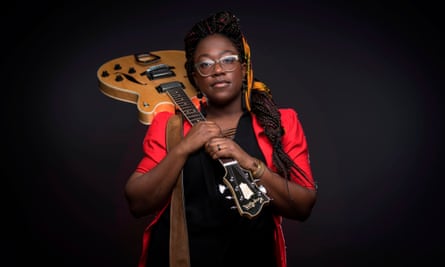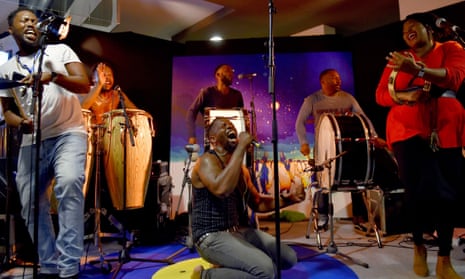BCUC, AKA Bantu Continua Uhuru Consciousness, are a young seven-piece band from Soweto who are shaking up South African music. Vocals and sturdy harmony work have always played a dominant role in township styles, but here the tradition is updated and reworked with the powerful but subtle use of drums and bass.
They play lengthy songs (the opener lasts nearly 20 minutes) that mix ancient and modern influences in a style that is distinctively South African, and includes soulful, elegant playing with passages that are as dramatic and frantically menacing as the best Congotronics bands in Kinshasa. BCUC have an impressive sense of dynamics, allowing songs to develop, fade away, change direction and then build to an often furious climax. Insistent, inventive bass guitar work holds it all together, as in Moya, which begins with a brooding riff and distant chanting, before the voices and percussion take over. Then there’s another switch, as echoes of what sound like ancient African war chants give way to cool, soulful vocals from Kgomotso Mokone, the one female member of the band, before the drums and chanting vocals return.
Elsewhere, what they call their “africangungungu” and “afropsychedelic” music includes passages of sturdy township styles. There are stirring harmony vocals on Insimbi that would provide a reminder of Ladysmith Black Mambazo if it weren’t for the drums and bass riff. The final track, Nobody Knows, brings further surprises. It starts off with a reworking of Nobody Knows the Trouble I’ve Seen, the gospel classic that has been recorded by everyone from Louis Armstrong to Sam Cooke, but is then transformed as chanting, rap and percussion take over. Those who fear that South African music is becoming too bland, or dominated by US influences, should take heart.
Also out this month

Mélissa Laveaux’s Radyo Siwèl (No Format!) is a fresh, intriguing set from a Haitian singer-songwriter who had been away from her homeland for 20 years before returning to explore its culture and history. It is is dominated by protest and Vodou songs from the era of the US occupation between 1915 and 1934, and highly recommended. The Turbans are a British-based fusion band whose “music from manywhere” switches from the Balkans to the Middle East and from flamenco to North Africa. The best track on their self-titled debut (Six Degrees) is a cheerful love song to Hackney.

Comments (…)
Sign in or create your Guardian account to join the discussion